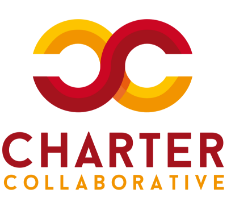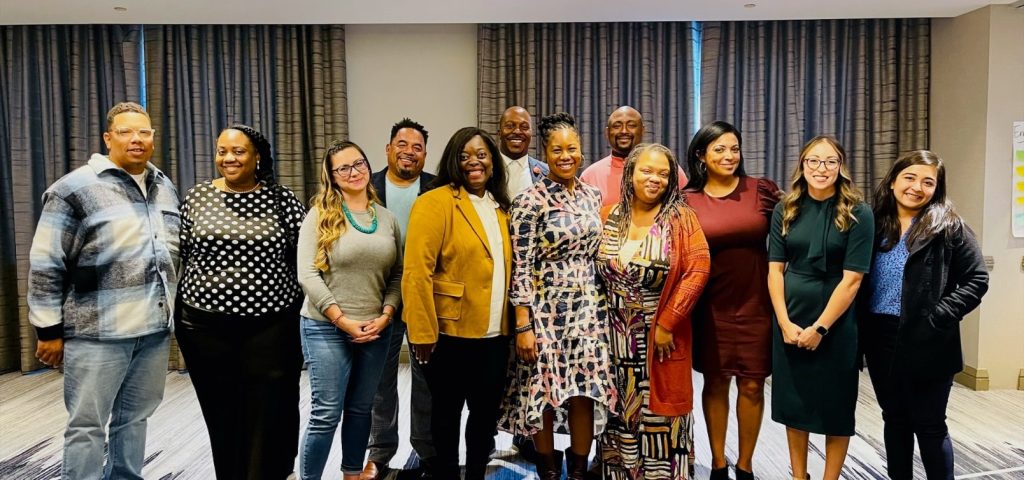
The Manati Fellowship Program
Catapult your Leadership
Manati is a fellowship program designed to support single-site charter school leaders in acquiring the necessary skills for sustaining and growing their school. The Fellowship fuses curriculum, in person-networking, and strategic development with a peer community to enable leaders to find scalable solutions to the pressing issues that are facing them. Manati–the Swahili word for catapult–is representative of our goal to provide leaders with the resources to grow in both performance and scale to support student success.
Defining Success: Growth Goals of the Fellowship Experience
The table below provides an overview of the Manati Fellowship goals, with a specific commitment to the Fellowship’s three pillars: Leadership Development, Community, and School Design.
What Manati Fellows Will Gain
What Learning and Growing Look Like Along the Manati Fellowship Journey
A Reimagined, More Liberatory Approach to Leadership.
Fellows will internalize and practice leadership actions and ways of being using the Liberatory Culture Continuum, a guide to help leaders interrogate, then resist the ways white supremacy culture has impacted our leadership
Reimagined School Designs, Practices, and Procedures
Grounded in an equity-centered design framework, Fellows will address a problem of practice that stands in the way of school transformation
A Manati CommUNITY
Fellows will build and nurture a deep, meaningful connection to a conscious community of Manati Fellows and alum. In addition, Fellows will build relational trust and transformational relationships rooted in shared identities and shared vision of student success
A Deeper Understanding of Historical Context, Current Issues, and the Promise for the Future of Liberatory Education
Fellows will grapple with topics related to race, history, freedom, education, access, and opportunity – with the intent of building context, deeper understanding, and a clear theory of change (and understanding of our role in influencing change)
Deeper and Broader Executive Leadership Competency
Through knowledge-sharing opportunities (“direct instruction”), “hands-on” learning experiences, readings, and dialogue with subject experts, Fellows will deepen and broaden competency in the Strategic Leadership, Organizational Leadership, and a number of functional competencies, including Finance, Operations, Academic Outcome Drivers, Teacher Development, and School Culture
Defining Success: Executive Leadership Competencies and Indicators
The Leadership Development arm of the Manati Fellowship is designed to build capacity and competency. To that end, our professional learning experiences are designed to grow Fellows’ capacity in the areas below.
What Manati Fellows Will Gain
What Learning and Growing Look Like Along the Manati Fellowship Journey
Strategic Leadership
Strategic and Systems Thinking
- Identifies root causes of challenges
- Develops sustainable and future-ready strategies
- Promotes equitable and inclusive systems
- Aligns organizational resources and focus areas to strategic priorities and to ensure sustainability
Funder Engagement
- Leverage leadership, strategy, and relationship building
- Apply knowledge in the following areas to secure funding and manage financial resources:
- Supporter stewardship
- Risk and reputation management
- Financial management
- Data – research and analysis
- Governance and compliance
Advocacy
- Demonstrate the ability to build coalitions and community consensus
- Advocate for policies and resources at local, state and federal levels to ensure equity of the educational experience for each student
Maximizing Talent
- Deeply understand how to identify great people managers
- Support managers to effectively coach and develop staff
- Planning delegation
Organizational Leadership
Leading with Racial Equity
- Identifies and removes barriers
- Partners inclusively
- Disrupts racism
Organization Culture & Climate
- Fosters a culture of belonging
- Understand where to invest time to drive greatest impact
- Ensures shared understanding of what excellence looks like
- Understands individual and team needs
- Understands power dynamics
- Respects the community
- Values and adapts to diversity
Effective Communications
- Differentiate approach to stakeholder engagement to strategically build support and ensure sustainability
- Strategically and regularly engages the Board
- Regularly and transparently shares results, celebrating successes and identifying areas for improvement
- Articulate compelling vision of student success
- Influence the media by using proactive communication strategies that serve to enhance and promote the school’s vision
Staff Development
- Coach leaders to implement program across the organization for continuity and cohesion
- Leverage leaders to drive toward organization targets and overall performance
Functional Competencies
Finance & Operations
- Understand how to assess/evaluate the effectiveness of resource allocation to achieve desired results
- Apply procedures for effective budget planning and management
- Demonstrate the ability to analyze need and allocate personnel and material resources
Academic Outcome Drivers
- Facilitate the planning and implementation of strategic plans that enhance teaching and learning
- Ensure alignment among curriculum, curriculum resources, and assessment
- Promote the use of varied assessments to measure student performance.
- Demonstrate the ability to identify instructional objectives and use valid and reliable performance
- Develops and implements rigorous and culturally relevant curriculum that supports diverse learners
- Fosters a culture of continuous improvement
Teacher Development
- Understand how to align professional development with student learning goals
School Culture
- Can apply coalition-building strategies to integrate community stakeholders in school culture
- Fosters a culture of learning and positive behavior
Single-site charter school leaders often work in silos without the benefit of support. The challenge is even more pronounced due to a lack of access to a network, resources and funding. Our research demonstrates a need for support in five key areas:
- Fundraising
- Teacher talent development
- Student academic and behavioral supports
- Finance and operations
- Innovation
The need for supports in the above core areas combined with the opportunity to employ the network effect to create solutions that can be shared across multiple schools creates the optimal environment for a fellowship program.
- Sessions on commUNITY: Building relational trust and what it looks like to lead authentically as a person of color
- Leadership development module: Personalized coaching + business and operations coursework
- Individual support: To assess opportunities for growth and expansion to serve more students
Manati Fellows will foster a peer-to-peer community of trust, engage with top notch service providers and leadership coaches, and design a solution to a shared problem of practice.


